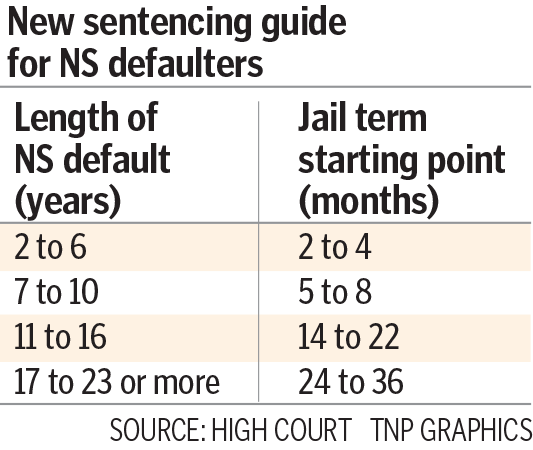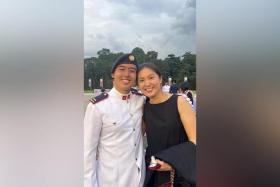Fresh sentencing guide for NS dodgers
Main factor in determining an NS defaulter's culpability is the length of time he defaulted
How well a national service (NS) defaulter performs in his duty when he eventually serves should have no bearing when deciding his punishment.
This was made clear yesterday by the High Court as it laid down fresh sentencing benchmarks for NS dodgers.
The benchmarks also "amplified" punishments for those who default for longer periods since it affects their fitness for service and the time they can serve as reservists.
The three-judge panel, led by Chief Justice Sundaresh Menon, set out four sentencing bands based on the length of default.
For those who evade NS for two to six years, the starting point is two to four months' jail; for seven to 10 years, it is five to eight months' jail; and for 11 to 16 years, it is 14 to 22 months' jail. For cases involving those who evade for 17 to 23 years or more, the default jail term kicks off from two to the maximum of three years.
The grounds of decision were related to the cases of three defaulters, who were given heavier sentences in April after the prosecution appealed.
Explaining its decisions yesterday, the panel rejected key parts of the sentencing benchmarks laid out by Justice Chan Seng Onn in February last year, when he sentenced a 25-year-old to three months in jail for defaulting for more than six years, and then gave a 1½ month discount for his good performance in NS.
The panel agreed with Justice Chan that the main factor in determining an NS dodger's culpability is the length of time he defaulted, and that anything over two years should mean a jail term. This, the court said, is because he would start serving only after his peers had completed their duty.
But, among other things, the court disagreed that the sentence should be calibrated based on whether the defaulter has a substantial connection to Singapore, that a discount should be given on the accused pleading guilty instead of claiming trial, and that exceptional NS performance should be a mitigating factor.

On the last point, the court said exceptional NS performance reduces neither the defaulter's culpability nor the harm he had caused by his offence - such as affecting the operational readiness of the armed forces and the morale of those who serve on time.
"Indeed, it is the obligation of every male Singaporean to do his best in his NS... It seems to us wrong for a defaulter who does no more than that... should be rewarded in this way," wrote Judge of Appeal Chao Hick Tin.
To recognise good NS performance in sentencing could also prejudice defaulters who are less fit and cannot perform as well, and might send a message to potential defaulters that they could defer their NS obligations and make up for it later.
However, the three judges, which included Justice See Kee Oon, said there was room to recognise "exceptional" acts of valour, such as saving another soldier's life.
Any sentence should also not be calibrated based on whether an NS defaulter had left the country at a young age and reaped fewer benefits as a citizen.
Whether someone has a substantial connection to Singapore and so has to serve is a matter of policy within the prerogative of the Defence Ministry.
"As long as Mindef had issued the enlistment papers to a male Singaporean, that person would need to serve NS and he would be liable for an offence... if he failed to comply," wrote Justice Chao.
Get The New Paper on your phone with the free TNP app. Download from the Apple App Store or Google Play Store now



